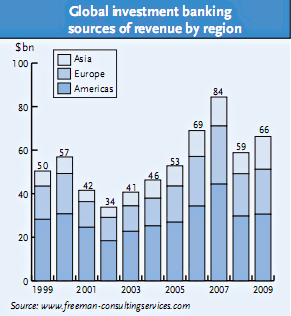You are currently browsing the tag archive for the ‘investment banking’ tag.

Europe’s subdued recovery and ongoing fiscal troubles are taking their toll on investment banks. According to a new analysis by Freeman & Co, a financial services research firm, investment banking fees in western Europe fell by 17% in the first four months of this year.
The pain in western Europe is in sharp contrast to a 53% jump in banking fees in America, an 87% rise in Japan and a whopping 161% surge in China. Banks in India and, perhaps unexpectedly, Eastern Europe also registered robust fee increases.
As in previous quarters, American investment banks continued their remarkable run of profitable trading days in the first quarter of this year. Bank of America, Citigroup, Goldman Sachs and JPMorgan recorded positive net trading revenues every day in the first three months of the year. Morgan Stanley, a laggard by comparison, lost money on only four days during the quarter. (Citigroup does not routinely report its daily trading results, but mentioned that it had no losing days in the first quarter.)

“Like peering through a grimy factory window, trading revenue histograms can provide a few clues as to what is happening down on opaque trading floors,” Moody’s writes in a recent commentary. Normally, a lack of negative trading days would be a positive sign of the “strength and diversification of customer franchises and risk management expertise,” Moody’s claims. But the stellar performance of banks’ trading operations is, perversely, becoming a risk as regulators and investors cast aspersions on the motives and methods that these market makers employ to generate bumper profits on their own accounts.
UBS’s latest quarterly results beat analysts’ expectations. More importantly—if only for pride’s sake—they also beat the results of local rival Credit Suisse.

Badly hit by the financial crisis, UBS has underperformed Credit Suisse for some time. Its recent reversal of fortune is largely thanks to a resurgence of its investment banking unit, the division primarily responsible for the group’s earlier downfall and government bailout. The bank is adding headcount in the division while it trims staff elsewhere in the group, most notably the client advisors in its beleaguered wealth management unit.
But as an analysis at the parent site argues, the short-term wisdom of riding the global recovery in investment banking activity may not extend to the longer term. Will wealth-management clients flock to the bank based on its strength in increasingly maligned business lines like derivatives trading?
When unveiling a new strategy recently, Deutsche Bank described Asia as its “key driver of revenue growth” in the coming years [subscription required]. It is far from alone. International investment banks large and small are looking to Asia—excluding moribund Japan—for sources of fee-based income to make up for drastically subdued activity in the west.

Throughout a new report on the state of banking from International Financial Services London (IFSL), a lobby group, Asia emerges as the lone bright spot in an otherwise cloudy industry outlook. Global investment banking revenues grew by 12% in 2009, down almost entirely to Asia. The region now accounts for 21% of business in the industry, up from 14% a decade ago. Revenues in Europe, meanwhile, have held relatively steady over this period, while the share of global banking business in America has fallen from 56% of the total in 1999 to 46% last year. As lenders, underwriters and advisors increasingly focus on Asia in the years ahead, the gradual shift of banking power to the east seems likely to continue.
Under the proposed “Volcker rule”, banks in America will not be allowed to own private equity funds. But they can still profit from them.

Freeman & Co., a financial services research firm, reckons that a rise in buyouts could boost fees for investment banks by 20% this year. This follows a fallow spell in 2009, when fees plunged to their lowest level in a decade. At US$3.3bn, fees collected from private equity firms last year fell by 30% from 2008, led by a particularly steep decline in Europe. Globally, 2009’s fees were only a fifth of what banks collected during 2007’s buyout bonanza, a high-water mark unlikely to be revisited any time soon.

